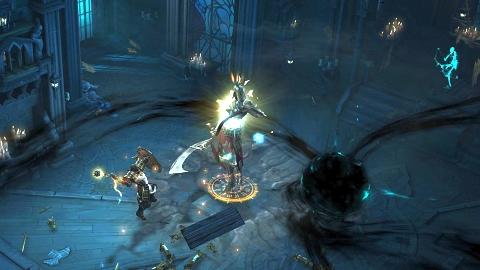development
Latest

How Gorillaz brought a global listening party to your phone
Gorillaz are having a house party at 500 locations around the globe. The animated band -- brainchild of musician Damon Albarn (Blur) and artist Jamie Hewlett (Tank Girl) -- is hosting the unusual audio soirée for its upcoming album launch for Humanz. Just streaming the new music to its recently launched app isn't Gorillaz's style, so instead it's created a sort of musical scavenger hunt that's part Pokémon Go, part concert.

Apple invests in Indian developers with a new app accelerator
In a bid to take advantage of India's growing developer community, Apple opened the doors to an App Accelerator in Bangalore today. True to its name, it'll serve as a place to speed up app development with weekly training, guidance and one-on-one app reviews. Apple opened similar accelerators in Naples and Brazil, but those were more focused on courting students as new developers. While the new Indian location will also try to win over students, it's more interested in honing the country's ready strong developer community, Apple marketing head Phil Schiller told NDTV.

Wanna develop an app for your sex toy?
Everything's a platform these days: Facebook, Twitter, Uber and others want developers to build software on top of their systems. But that rarely happens for sex-toy manufacturers, who often lack the knowledge, desire and customer base to bother. OhMiBod is looking to change that by offering coders the opportunity to build their own applications for its BlueMotion vibrators.

HTC launches its own VR app and game studio for Vive
HTC spun its Vive VR business into a subsidiary back in June and today the company announced it's launching its own studio for VR app and game development. The appropriately named Vive Studios will release games that are developed in-house and by other companies in an effort to boost interest in its virtual reality gear. The first title from the new initiative is called Arcade Saga: a trio of games that shows off HTC's room-scale VR from the internal 2 Bears Studio.

Rodent trials suggest screen-addiction hurts child development
A new study from the Seattle Children's Research Institute may have taken the first step towards confirming something my parents have been telling me for decades: too much TV rots your brain. Well, at least it does for mice. Scientists found that raising groups of mice in an environment designed to simulate extreme screen exposure developed behaviors similar to those found in children with ADHD -- resulting in adult mice with more memory problems and less patience.

Steam is turning into the App Store and that's OK
Steam changed the video game industry in the same way Netflix changed television. Digital distribution was a natural evolution for gaming in the early 2010s, allowing PC players to skip the midnight-release lines at Gamestop and purchase new titles with the click of a button. While Steam wasn't the first hub to offer digitally distributed games -- Valve debuted it in 2003 -- it quickly gained a massive following and by 2011 was undoubtedly the largest platform for finding, buying and playing games on PC, Mac and Linux. Today, Steam hosts more than 10,000 titles and nearly 160 million active users per month, according to Steam Spy and EEDAR. Steam is Netflix on pixelated, interactive steroids.

The co-creator of 'Rick and Morty' just founded a VR studio
Most folks know Justin Roiland as the co-creator and lead voice actor behind Adult Swim's Rick and Morty, but it's less widely known that he's obsessed with virtual reality. The entertainer was one of the first backers of Oculus' original Kickstarter, and has reportedly filled notebooks with game ideas and concepts. Now, he's is going all in on his obsession: today, in partnership with former Epic Games executive producer Tanya Watson, Roiland announced Squanchtendo Games. It's a VR game studio with, in Roiland's words, one simple goal: "We just want to make super duper games dooood."

Google makes building apps easier with Android Studio 2.0
In 2013, Google launched an official integrated development environment (IDE) called Android Studio to make app development for its mobile platform faster and more visual. That must have worked, as the Play Store is now bulging with nearly 1.6 million apps, the most of any store. However, it's long overdue for an overhaul, so the search giant has launched Android Studio 2.0 with plenty of new speed and productivity features.

Now you can create Windows 10 apps without writing a line of code
The Windows Store isn't exactly known for being a robust app marketplace, and Microsoft knows it. The company is always looking for new ways to attract developers to the platform. In the past, Microsoft made tools designed to port iOS and Android apps to Windows, and created the Universal app system that puts all Windows apps on the same platform. Now, Microsoft has updated its App Studio to allow users to create, prototype and submit an app for release from the comfort of a web browser -- without installing Visual Studio or writing a single line of code. It works, too: I just created a functional Windows 10 app in less than ten minutes.

Even critically acclaimed indie games get delayed
Lovers in a Dangerous Spacetime was a hit in 2013 when it was just a multiplayer, neon-streaked demo mixed in with all of the nominated, blockbuster indie titles at the Independent Games Festival. Lovers was up for an award in Visual Art, and even though it lost to Kentucky Route Zero, the nomination was enough to create buzz around the game and its studio, Asteroid Base. At the time, co-creator Jamie Tucker felt confident that Lovers would be done within the year. Now, two years later, Lovers in a Dangerous Spacetime is set to debut on Xbox One and Steam on September 9th. Yes, in 2015. We asked Tucker via email what happened with Lovers' development timeline and he broke it all down -- including details that offer a glimpse at the real rigors and lucky breaks of game development.

Facebook's F8 app hints at big changes for Messenger
Typical. Just when you're about to unveil a new project at your own developer conference, the event's companion app breaks the news ahead of time. A notification from Facebook's F8 app, presumably scheduled for the 26th, went out early to inform conference attendees that the company was announcing two new initiatives: Parse for IoT and Messenger as a Platform.

Life is Feudal unveils its 2015 roadmap
So what will the next year bring for Life is Feudal? Lots of things, since the game is still in its early access phase. But you don't have to take our vague and noncommittal words for it; you can just take a look at the game's official 2015 roadmap. The page outlines what will be coming to the game each month from here until September, along with progress bars to give hopeful players an idea of how far along the team has gotten on these features. The team is going to be taking a break on all of this during their first trip to a convention, though; the staff from Bitbox will be in-person at PAX South, displaying at Booth 1261 for fans and those who have never heard of the game before. In other words, it should be a pretty busy 2015 for the game. [Thanks to Saxxon for the tip!]

Daylight developer closes, passes Blacklight IP to new studio
Seattle-based developer Zombie Studios is closing its doors after over twenty years of operation. The developer announced the news on its website, noting that the studio's owners are retiring. As a result, former Zombie Studios employees started a new company, Builder Box, and "acquired some of the work Zombie is parting with." That includes all rights to Blacklight: Retribution (seen above), Zombie Studios' 2012 cyberpunk first-person shooter. Builder Box was formed by Andy Kipling and Russell Nelson, Zombie Studios' director of production and technical director, respectively. In a PlayStation Forums post last week, Kipling assured Blacklight: Retribution fans that "the people behind the scenes who have been constantly contributing to the Blacklight universe for the last four years remains intact," and that players "can look forward to more updates and exciting changes in the coming year." Zombie Studios formed in 1994, launching its first game the following year, a spaceship simulator known as Ice and Fire. The developer is known for creating the Spec Ops line of tactical shooters, starting with Spec Ops: Rangers Lead the Way in 1998 for PC. Among the final games developed at Zombie Studios is the Atlus-published survival horror game Daylight, which arrived on PC and PS4 last year. [Image: Zombie Studios]

Assassin's Creed director's next game is 'historical action'
Former Assassin's Creed series Creative Director Patrice Desilets discussed the direction of his upcoming game this week. The game will be of the third-person, "historical-action-survival" variety, as noted in a press release found after the break. Desilets launched Panache Digital Games just over one month ago, a Montreal-based studio consisting of "industry veterans that got together to tell stories that we feel are original and cool," according to the developer's website. "Indeed AAA Games, I believe in them," Desilets added. "I believe wholeheartedly that this medium we call 'video games' can be a positive force for change in our society and that AAA quality gaming experiences have unmatched strength to achieve this." The statement complements Panache's mission, per its website: "We make AAA quality third-person action-adventure games, with a narrative twist. We're not a 'me-too' company. We don't do trendy game models or content." To thank "first and beloved supporters" that showed immediate interest in Panache's ambitions, Desilets said the team decided to give those fans a "full copy" of its next game. "Let's call it a free to play game that's not a 'free-to-play' game," he added. Desilets was let go by Ubisoft in May 2013, marking his second departure from the company. The Assassin's Creed director first left the publisher in June 2010 to take a "creative break from the industry" before joining THQ Montreal one year later, following the expiration of the non-compete clause in his contract. THQ Montreal was acquired by Ubisoft in January 2013 along with Desilets' project at the time, 1666. Just two months after Desilets officially re-joined Ubisoft, the publisher suspended development on 1666. He filed a lawsuit against Ubisoft in June 2013 with the option to acquire the rights to the game. [Image: Panache Digital Games]

Camelot Unchained's Mark Jacobs on the warrior class and development transparency
City State Entertainment -- an indie studio that's becoming better known to our readers, I imagine, after it ran away with our poll for best studio last week -- has today posted its first class concept reveal. The tentatively named Drengr is the Viking warrior class, and in its long design document, the studio has outlined just how the archetype fits into the proposed Path system that will govern character development in the crowdfunded RvR MMORPG. We spoke to CSE's Mark Jacobs about the Path system, warrior reveal, and the impact of transparency on the game development process. Enjoy the interview below!

The strategies and challenges involved in developing new programming languages such as Swift
WWDC 2014 was unquestionably one of the best Apple events in years. While there were no hardware announcements, developers and Apple enthusiasts at large were treated to a two hour event chock-full of surprises, not the least of which was the introduction of an entirely new programming language Apple calls Swift. A project in the making since 2010, Swift's selling point is that developers can more simply and intuitively put together advanced iOS apps. With the introduction of Swift, Apple now adds its name to a respectable list of companies that have similarly attempted to ably craft their future by rolling out new programming languages. On that note, Scott Rosenberg has an immersive post up on Medium detailing the seemingly increased effort from large tech companies to create their own programming languages. The article focuses mostly on Google's Go and Apple's Swift, and provides a good read for anyone interested in the benefits, challenges, history behind and strategies involved in creating a new programming language from scratch. The article also includes a number of interesting and optimistic soundbites on Swfit from Andy Hertzfeld, a famed and uber-talented software engineer who was an integral part of the original Mac development team in the 80s. Years later, Hertzfeld would eventually wind up at Google where he helped develop Google Plus. Today developers say the language [Objective C] is showing its age. "Apple had decades-old cruft in the face of anyone who wanted to write for any of their platforms," says Andy Hertzfeld, a software veteran who wrote much of the original Mac operating system and recently retired from Google. "I got pretty excited about Swift when I saw the announcement, because I've always despised Objective C. I like the principles behind it, but I hate the syntax, and have never been able to really enjoy programming in it." ... "Beautifully done," says Hertzfeld. "It relieves enormous pain points right in everyone's face. So the only iOS developers who are not going to get on top of Swift are the dumb ones." Since Swift is built to co-exist with Objective C code within the same project, toe-wetting is easy, even for developer sticks-in-the-mud. That notwithstanding, Hertzfeld is holding off on jumping head first into Swift for the time being as it effectively means you're exclusively working behind Apple's simultaneously adored and hated "walled garden." Again, the article is well worth a read as it provides a number of interesting insights and observations regarding the reasoning, struggles, and repercussions that invariably accompany an endeavor as massive as developing a new programming language.

Nerd Kingdom is hopeful about an investor for TUG
Developer Nerd Kingdom has been fairly quiet since its announcement in September that half of its team was being let go in order to keep development moving on TUG. The good news is that the needed investors might be right around the corner. An update on the game's Kickstarter page notes that the team is entering what appear to be final talks with a potential investor, ensuring that the team has enough money to finish the game. The update stresses the fact that said investor is not looking to alter the development process or compromise the team's vision for the title. in terms of actual development, the game's multiplayer mode is coming together. It's also going to be increasing in price soon to $19.99, so if you'd been holding off on buying the game but really want to pick it up for only $10, your time is running out, although given recent events, you may want to hold off a little bit until the investment is a sure thing.

Molyneux: Kickstarter, Early Access can be 'destructive'
Peter Molyneux's Godus earned £526,563 ($852K) on Kickstarter in December 2012, yet the designer recently admitted that he would delay the funding campaign entirely if he could go back to the game's pre-planning stages. In an interview with TechRadar, the Fable series designer deemed Kickstarter and Steam Early Access as "very destructive to the final quality" of games that aren't particularly far along in their development stages. In the case of Godus, 22 Cans' spiritual successor to Populous, Molyneux said supporters had a "view of what the game is going to be like" based on the Kickstarter project, which differed from what the "invest to play" game wound up becoming. "I'm not saying I would never do Kickstarter again, but if I was to do Kickstarter again, I would say 'look, we've done half the game, you can download this demo, you can play the game,'" he said. "'You know what the game's going to be, now we're going to take it from this point to this point.'" Godus is currently available on PC, Mac and Linux via Steam as well as iOS and Android. [Image: 22 Cans]

Pantheon: Rise of the Fallen shows off early development screenshots
It's been a little while since Pantheon: Rise of the Fallen shifted over to an entirely volunteer-based development team, which has nevertheless resulted in further development, albeit slowly. A new set of teaser images have gone live on the game's Facebook page, showing off some of the sample areas and interface elements of the game as a preview ahead of an expected video footage release. Needless to say, some of the models (including the player avatar displayed) are still using placeholder assets rather than final versions, but there are enough screenshots to get a sense of where the game's development currently is at. You can take a look at the pictures yourself and decide if the game is coming along well despite its troubles or looks rough even for early demonstrations.

Diablo was once considered for an MMO, but no longer
In many ways Diablo III seemed like the sort of game that would lead naturally into an MMO for the franchise. The online functionality is there, the options are there, and it's not as if Blizzard's big MMO didn't derive quite a bit from the framework of Diablo II, after all. But according to content designer Kevin Martens, there are no current plans to take the franchise into an MMO space, even though there were plans to do exactly that not too long ago. The original thinking was that Diablo III would be the sort of game that could evolve its setting to a point where an MMO felt organic, natural, and appropriate. However, a shift in corporate culture and overall development focus cut those plans short before they went much further than discussion. Seeing how players enjoy Diablo III and what they like about the game has resulted in a shift in focus with more future content for the game... but no MMO exploration.










